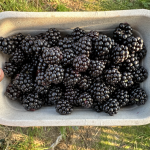On benefits of connectedness
They are here! Blackberries in my belly every day. I love coming to the allotment and filling up our cardboard box with a generous amount of black treasures (for breakfast, for pudding, for an evening snack…). Every time I stand in front of blackberry bushes surrounding the allotment common areas, I bow to the generous offerings of those persistent plants. They grow super fast throughout the year, offer shelter to birds and insects, and once a year feed us, too. Sometimes, I am ashamed to pull them out of the plot, but then I remember that as a gardener, my role is to steward the land, so I have to make those choices; they would take over the entire plot if I let them. They are also quite magical and not always friendly, thus reminding us to stay humble in the face of Nature:
“Celtic lore says that blackberries are fairy fruit and may bring bad luck to people who eat them. Blackberries were also considered protective against earthbound spirits and vampires. It is said that if planted near the home, a vampire couldn’t enter because he would obsessively count the berries and forget about the people inside.”
In many cultures, blackberries symbolise resilience, abundance, and protection. Standing in front of those gentle giants, I certainly feel that way.
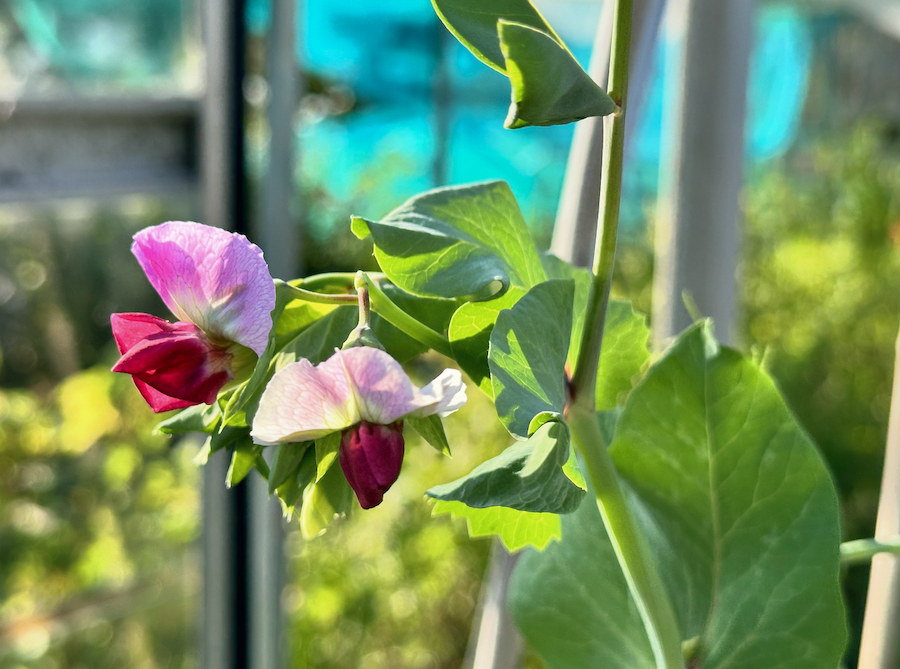
As mentioned last week, this year is difficult for growing due to wet weather and slugs. Our allotmenteering needs to be carefully balanced with a busy life, so we have decided to keep things simple this year: potatoes, peas, berries, and grapes. The focus this year is on the cultivation of the soil instead, and potatoes help with that because we need to dig it up more often. It is not ideal for the wildlife (no-dig gardening is much better), but I am impatient, and the initially overgrown plot came with bindweed, so it’s still a battle. Gradually, it has been a year of wild strawberries, blueberries, plums, and apples. We had our first round of potatoes and made hashbrowns (also as a reaction to the shrinkflation sizes of food at the Feast On Fest in Bristol, mind you). Yum!
There is also an added benefit of growing your own food in the UK – we no longer have to go to supermarkets and face the national sadness of the new reality. We order our veg from the incredible Riverford and complement it with an allotment harvest. The post-Brexit economic crisis, combined with the wave of burnout and an absolute avoidance of Covid precautions, is not talked about. It’s shocking just how silent we are about it on a daily basis (in British-English terms, “it’s a bit awkward”): many empty shelves, minimal staffing, messy layouts, limited lines of basic and expensive foods. And the overarching sense of deep, deep sadness. Don’t get me wrong, I am not a fan of supermarkets at all and do not expect ten types of ketchup, but I would like to see cleanness and order, happy staff, basic choice between inexpensive (sensible) and expensive food (treat) and relaxed customers in the spaces I also occupy; that’s all. It is all interconnected. I am aware that this affects how we all feel. So, Nature and gardening are brilliant responses to this. It is soothing, empowering and humbling to pick our own wild strawberries for breakfast.
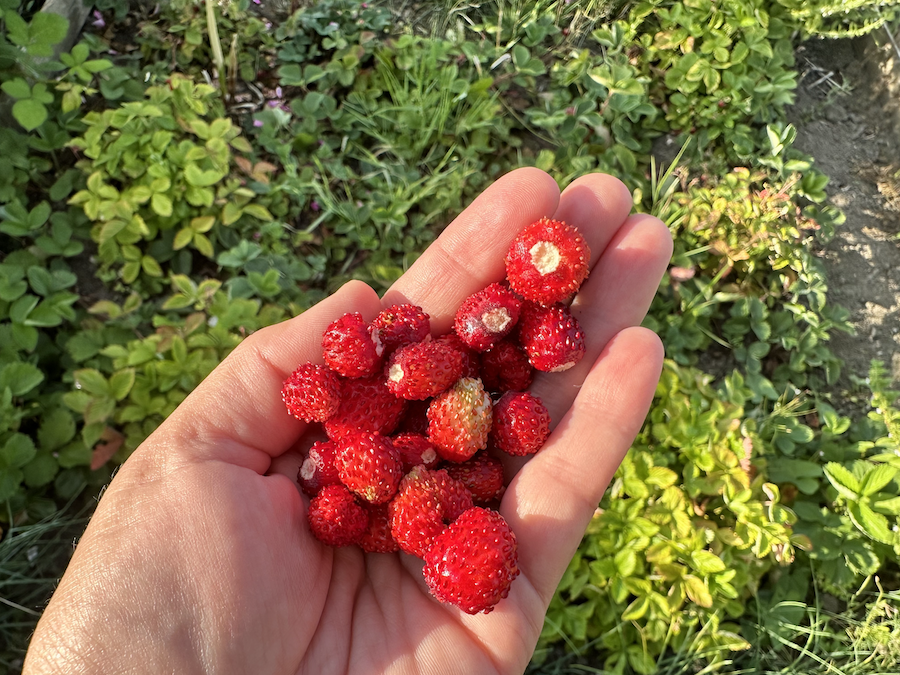
Connectedness is a response to the modern identity (and real) crisis we are facing as a species. Nature Connectedness is by now heavily evidenced to improve our health and wellbeing. Hospital patients heal faster when spending time in spaces with natural landscapes – Bristol Children’s Hospital adult A&E has images of trees printed on the ceiling, and it really helps when you are worried about your life. Dysregulated children calm down immediately after a session of barefoot walking on the grass or a gentle cuddle with a dog. Our heartbeat slows down when we sit out in the garden for lunch in between work calls or even move the meeting outdoors. We know this.
This summer, I am spending a lot of time thinking about connectedness among humans. I posted last week about the disconnect in how we relate to the world around us, but it’s also important to think about how we relate to others. Steve Taylor is making fantastic points on the challenge of hyper-disconnection – in its most extreme version, presenting in psychopathy and clinical narcissism (I say “clinical” because we heavily overuse and misuse the term “narcissism” since the rise of social media). Human connectedness is a spectrum – from hyper-disconnected and emotionally shut down, but also capable of brutality to healthy connectedness, which we now know (thanks to the polyvagal theory used, for example, in animal-assisted therapies) is our healthy, happy, natural state.
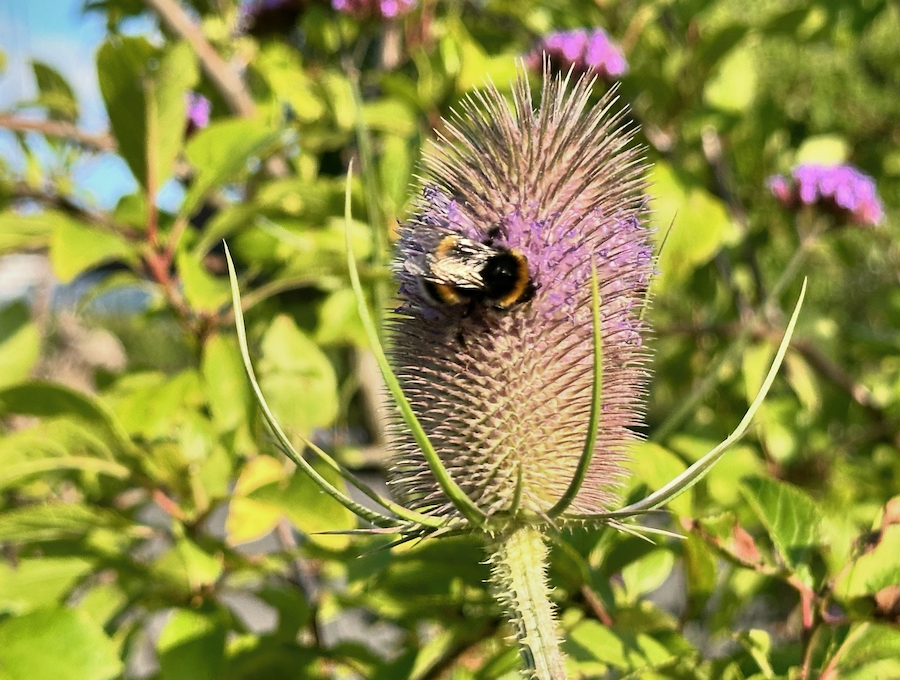
Please do not confuse connected and happy with extroverted personality—we all need human connection, and our nervous system does. I do not remember the study that evidenced that a day of severe social isolation has the same impact on our biology as smoking a pack of cigarettes, but having been there myself (for a few years!), I absolutely agree with those costs. So, we need to think very carefully about the intentional protection and cultivation of our human networks. As a migrant, I am facing those dilemmas more, but I also have an increased capacity to notice, build and develop new connections (my secret power). I intentionally join communities that make me happy and improve my wellbeing. I contribute to the promotion of their impact by inviting others (the Geek Therapeutics team, for example). If there is one thing I love about digital connectedness (including well-trained algorithms), it is how it allows us to join similarly-minded people and explore new landscapes, too.
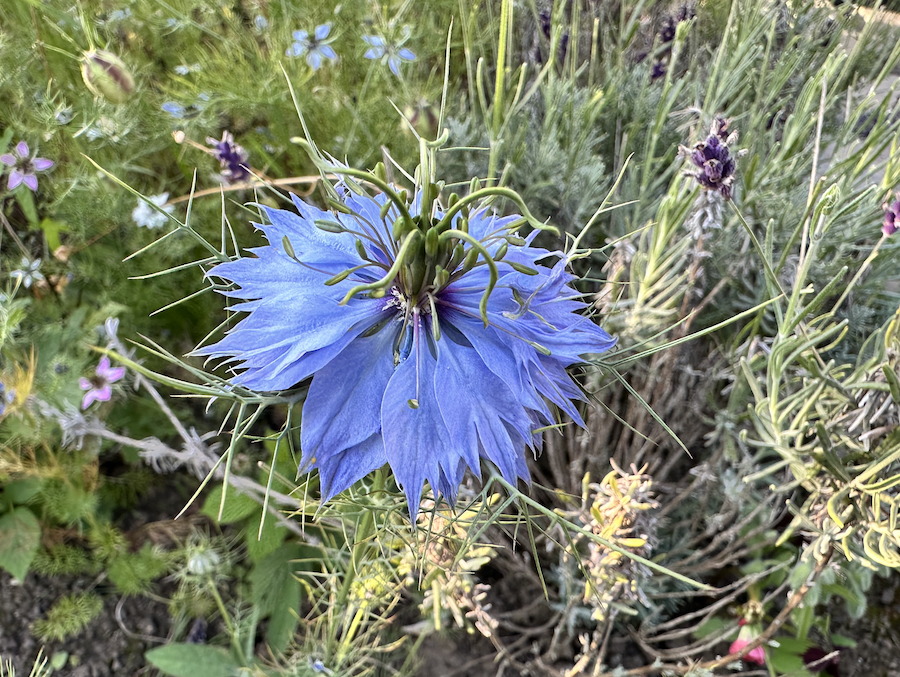
Reflection
Today, I invite you to think about cultivating human connectedness. Small note: if you are severely socially isolated beyond your control, please take care when reading this. I can only hope it will inspire you to seek professional and informal help – even if it’s picking up the phone to speak with someone or gently commenting on online posts from trusted, established sources.
- Map out your current networks and identify where you can improve the cultivation of connectedness. It’s not uncommon to spend more time chatting to our neighbours than maybe to the closest, kind family members. Maybe you can shift your focus towards people who are more important to you.
- Call that person you’ve been meaning to call for a while and invite them out, or, if easier, set up a Zoom with a cuppa one evening to just hang out.
- Play games – board games, online games, any games. Playing games is one of the memetic building blocks of humanity – we are wired for gaming. They are fun, and they shift the focus from directly engaging human-to-human to discussing something else. And most games are based on positive psychology so they usually lift us up.
- Review your friendships and notice patterns: who supports your connectedness, who may feel unsafe and need boundaries. If you have no friends (an estimated 30% of us here in the UK), can you practice human connectedness through body language or a more meaningful small talk? Can you join an offline or online hobby group and connect with people who share your interests? Maybe consider volunteering for a start?
- Practice congruence. In our UK culture, we are very distant and disconnected, and it may feel super awkward to engage in meaningful conversations with strangers. However, on the other hand, the risk is much lower—they do not know us! So help a tourist, an elderly neighbour, or a fragile person carry their shopping—just for that short moment of connection, even if, at first, it feels weird. ]
- Practice simple things—eye contact (if it aligns with your neurodiversity and culture), a smile, and caring spatial positioning in public spaces (for example, letting an elderly person go in front of you). it really isn’t the end of the world if someone doesn’t smile back, but it is so magical if they do!
(I am off to work soon, but before I go, I will check with the people around me to see how today is for them and carry this sense of connectedness with me into the rest of the day. Have a soft one!)

